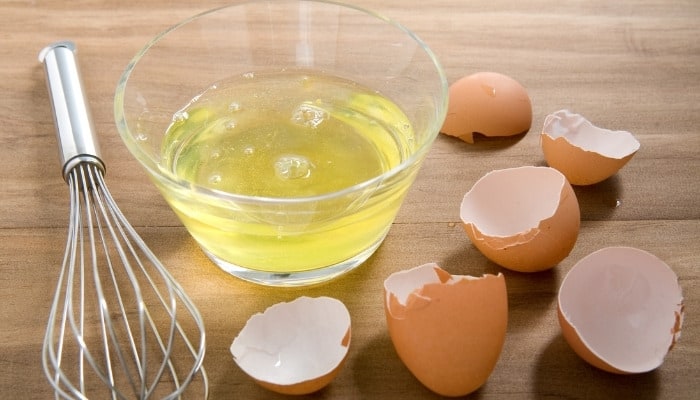While it’s tempting to use our leftover food as fertilizer for our plants, we must set limits to ensure their well-being.
Egg whites have divided gardeners for ages. Some swear by their benefits to the plants, while others avoid them at all costs.
Is egg white good for plants? Egg whites are naturally rich in nutrients that plants need to grow and thrive. You can add raw egg whites to the soil to raise calcium, magnesium, phosphorus, and potassium levels. Make sure the soil’s nitrogen is not high and pH levels are close to neutral to facilitate calcium absorption.
Of course, raw eggs tend to rot quickly, especially in warm temperatures, so you need to be judicious when using egg whites in the soil.
The smell is a serious drawback to consider. Read more to find out how to use egg whites to fertilizer plants.
What To Know About Using Egg Whites for Plants
Growing plants continuously in the garden without giving the soil time to rest can impoverish it.
Vegetables growing in soil that lacks micronutrients often suffer from diseases such as chlorosis and blossom end rot.
Luckily, you can amend the soil and use readily available materials such as egg whites to replenish the missing micronutrients and ensure high yields of your fruits and vegetables.
Do Egg Whites Benefit Plants at All?
It turns out that humans and plants need more or less similar nutrients. This is why our food leftovers tend to feed our garden plants as well.
This applies to eggs as much as to any other nutritious food we consume.
When you add egg whites to the soil, you are offering the plants many micronutrients that they need to fight off diseases and develop a robust root system.
This is true especially of vegetables and fruits that need reasonable amounts of calcium, potassium, and manganese in the soil to have balanced growth.
You can think of egg whites as an affordable and handy plant-food supplement to add to your vegetable patch and flower bed.
Nutrients Found in Egg Whites
Not surprisingly, egg whites that we love to consume cooked are packed with micronutrients that plants can benefit from as well. These nutrients include the following:
- Calcium: Every raw egg white has 2.3 milligrams of calcium.
- Magnesium: You can get as much as 3.6 milligrams of magnesium from egg whites.
- Potassium: Eggs are rich in this valuable macronutrient, yielding about 53.8 milligrams.
- Phosphorus: Egg whites have trace amounts of phosphorus, averaging 4.9 milligrams per egg.
- Protein: Every egg offers 4 grams of protein.
Egg whites are also rich in other nutrients, such as sodium, selenium, and folate among others.
Downsides of Using Egg Whites in the Garden
When you break the eggshells and mix the egg whites into the soil, you start a chemical process with some unwanted side effects.
As the eggs degrade and rot, sulfur is released into the air. Besides the unpleasant smell, rotten eggs are an open invitation to pests and rodents to invade the garden and damage the plants.
Another problem with egg whites as fertilizers in the garden is that they take longer to break down and release their nutrients into the soil.
If the soil is depleted and the plants need nutrients quickly, then egg whites are not the best option to enrich the soil and save the plants.
Is It Worth It To Use Egg Whites for Plants?
Egg whites are an excellent organic source of many nutrients for many plants. Unlike chemical fertilizers, egg whites will not impact the taste and flavor of the fruits and vegetables you grow in the garden.
Additionally, since they’re slow-release fertilizers, egg whites will not stress out the plants with a sudden growth surge.
That said, you have to consider the drawbacks of relying on egg whites to fertilize your plants. The smell and pests in the garden alone are enough to put people off the whole idea.
This is why many gardeners prefer to compost eggs instead of using them raw. Composted eggs have all the nutrients of the raw eggs without the foul odors.
Helpful Ways To Use Eggs in the Garden
You don’t have to crack eggs and leave the egg whites to rot in the soil to get the most out of their nutrients. Here are safer and less malodorous ways to use eggs in your garden.
- Plant Food: Eggshells are rich in calcium and will break down nicely without making the garden smell like a landfill.
- Mulch: Smash your eggshells into tiny pieces and spread them in thick layers around the base of plants as mulch. It doesn’t rot as easily as leaves and will discourage pests and weeds.
- Repel Pests: Here you’ll need the eggshells in larger chunks than you’d use as mulch. The sharp edges of the eggshells are natural barriers that keep soft-bodied insects off your flowerbed and veggie patches.
- Bird Food: Offer crushed eggshells as food for calcium-deficient birds. Birds need calcium to lay eggs, and eggshells in the birdfeeder are a welcome treat.
Related Questions:
Are Banana Peels Good for Plants?
Banana peels are rich in nutrients including phosphorus to encourage blooms, sulfur that repels pests, calcium that is essential for root development, and magnesium that fights off diseases.
You can shred them and add them to the compost pile to let them break down and release their nutrients into the compost.
Is Coconut Water Good for Plants?
Besides being rich in calcium and magnesium, coconut water also contains cytokinin hormones. These hormones improve cell division, which triggers better root development and crown growth.
Conclusion
Egg whites have many macro- and micronutrients that the fruits and vegetables in your garden cannot do without.
However, egg whites take a long time to break down and have unpleasant odors that could attract pests and rodents to the garden.

